一。libevent概念
Libevent 是一个用C语言编写的、轻量级的开源高性能事件通知库,主要有以下几个亮点:事件驱动( event-driven),高性能;轻量级,专注于网络,不如 ACE 那么臃肿庞大;源代码相当精炼、易读;跨平台,支持 Windows、 Linux、 *BSD 和 Mac Os;支持多种 I/O 多路复用技术, epoll、 poll、 dev/poll、 select 和 kqueue 等;支持 I/O,定时器和信号等事件;注册事件优先级。
二。安装
1.从官网下载安装包libevent-2.1.8-stable.tar.gz
2.解压 jar zxvf libevent-2.1.8-stable.tar.gz
3.进入解压目录
4. ./congifure
5. make
5.sudo make install
6.以上完成后会在/usr/local/lib下生成库文件,将/usr/local/lib加入到 /etc/ls.so.conf内
7.sudo ldconfig -v
三。基本函数

1.创建事件处理框架

2.创建事件

what的参数可以设为:

3.将事件加入到事件处理框架中(让事件处于未决状态)

4.事件处理框架循环处理事件(事件触发后执行事件的回调函数)

5.将事件从事件处理框架中卸下(将事件设置为非未决)

6.释放事件
![]()
7.释放事件处理 框架

8.libevent读写管道
//写管道
1 #include<stdio.h> 2 #include<unistd.h> 3 #include<stdlib.h> 4 #include<sys/types.h> 5 #include<sys/stat.h> 6 #include<string.h> 7 #include<fcntl.h> 8 #include<event2/event.h> 9 10 //事件回调函数 11 void write_call_back(evutil_socket_t fd,short what,void *arg) 12 { 13 //写管道 14 char buf[BUFSIZ]; 15 static int num=0; 16 sprintf(buf,"this is the %d data ",++num); 17 write(fd,buf,sizeof(buf)); 18 return ; 19 } 20 //写管道 21 int main() 22 { 23 //openfile 24 int fd=open("myfifo",O_WRONLY|O_NONBLOCK); 25 if(fd==-1) 26 { 27 perror("open err"); 28 exit(1); 29 } 30 //写管道 31 struct event_base* base=NULL; 32 base=event_base_new(); 33 //创建事件 34 struct event* event=NULL; 35 //检测写缓冲区是否有空间写 36 event=event_new(base,fd,EV_WRITE|EV_PERSIST,write_call_back,NULL); 37 //添加事件 38 event_add(event,NULL); //阻塞等待事件发生 39 //事件循环 40 event_base_dispatch(base); 41 //释放事件 42 event_free(event); 43 //释放框架 44 event_base_free(base); 45 close(fd); 46 return 0; 47 }
//读管道
1 #include<stdio.h> 2 #include<unistd.h> 3 #include<stdlib.h> 4 #include<sys/types.h> 5 #include<sys/stat.h> 6 #include<string.h> 7 #include<fcntl.h> 8 #include<event2/event.h> 9 10 //事件回调函数 11 void read_call_back(evutil_socket_t fd,short what,void *arg) 12 { 13 //读管道 14 char buf[BUFSIZ]; 15 int len=read(fd,buf,sizeof(buf)); 16 printf("buf:%s ",buf); 17 printf("read event:%s ",what&EV_READ?"yes":"no"); 18 return ; 19 } 20 //读管道 21 int main() 22 { 23 unlink("myfifo"); 24 //创建有名管道 25 mkfifo("myfifo",0664); 26 27 //openfile 28 int fd=open("myfifo",O_RDONLY|O_NONBLOCK); 29 if(fd==-1) 30 { 31 perror("open err"); 32 exit(1); 33 } 34 //读管道 35 struct event_base* base=NULL; 36 base=event_base_new(); 37 //创建事件 38 struct event* event=NULL; 39 event=event_new(base,fd,EV_READ|EV_PERSIST,read_call_back,NULL); 40 //添加事件 41 event_add(event,NULL); //阻塞等待事件发生 42 //事件循环 43 event_base_dispatch(base); 44 //释放事件 45 event_free(event); 46 //释放框架 47 event_base_free(base); 48 close(fd); 49 return 0; 50 }
四。bufferevent
1。概念
bufferevent是libevent基于套接字创建的IO缓冲区,分为读缓冲区和写缓冲区。
当读缓冲区有数据时,会调用相应的读回调函数。
当有数据写入写缓冲区时,会调用相应的写回调函数
bufferevent相当于服务器与客户端建立连接之后(accept之后),对读写事件进行监听并处理。
2.函数
1.创建带缓冲区的事件
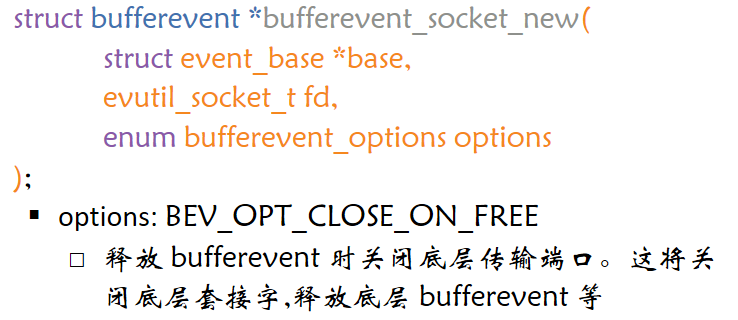
2.缓冲区链接(客户端)
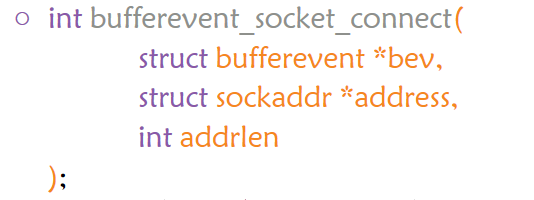
3.设置事件回调函数
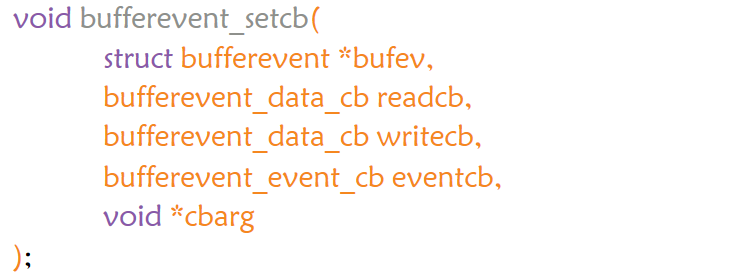
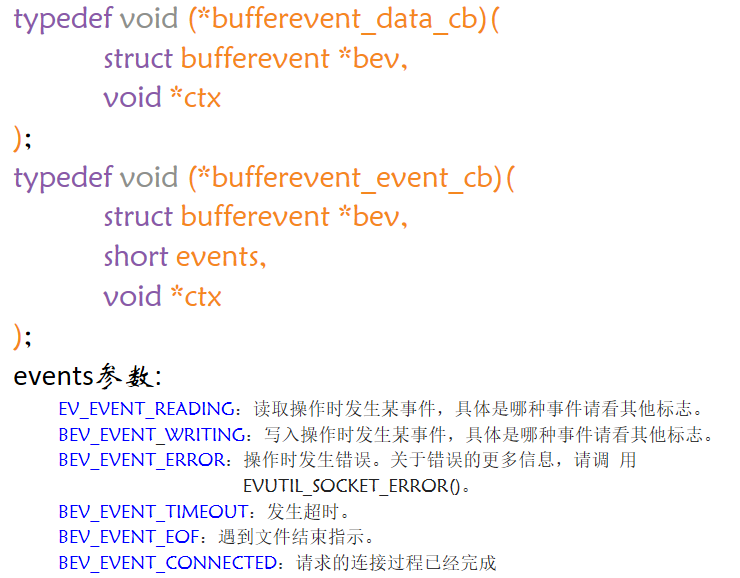
4.设置缓冲区可读,可写
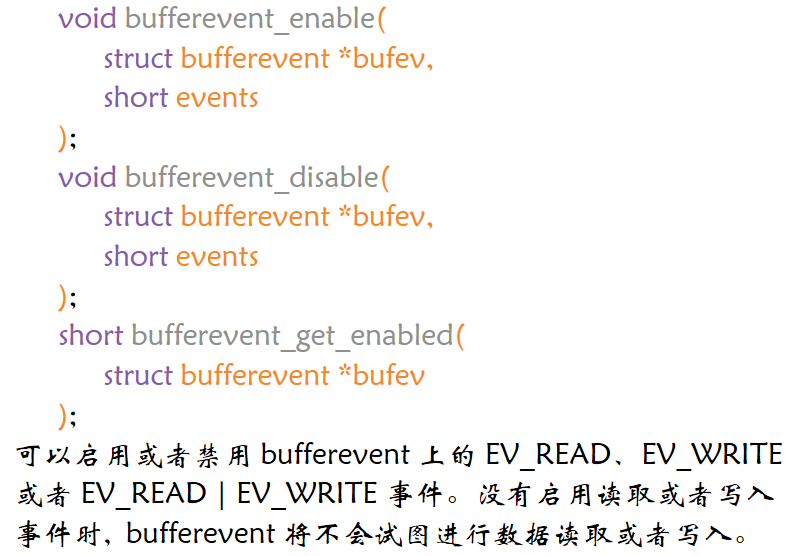
5.释放缓冲区
![]()
五。evconnlistener 连接监听器
1.简述
evconnlistener在服务端可以代替socket,bind,listen,accept的操作,并且可以设置监听的回调函数,当有客户端连接后执行回调函数。
2.函数
1.创建连接监听器
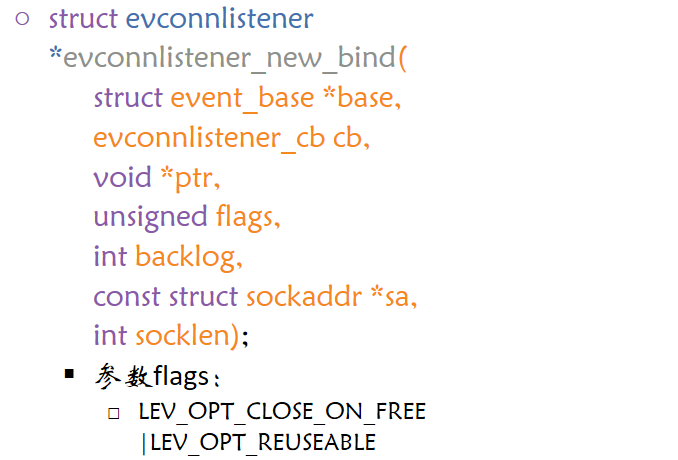
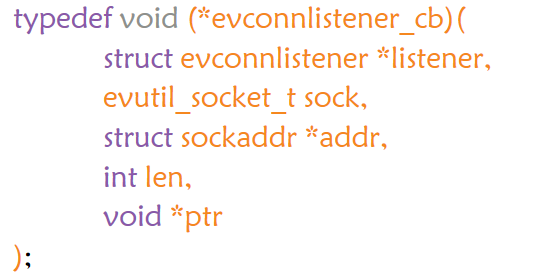
2.启用和禁用evconnlistener

服务端实现
1 #include<stdio.h> 2 #include<unistd.h> 3 #include<stdlib.h> 4 #include<sys/types.h> 5 #include<sys/stat.h> 6 #include<string.h> 7 #include<ctype.h> 8 #include<event2/event.h> 9 #include<event2/bufferevent.h> //带缓冲区的事件 10 #include<event2/listener.h> //连接监听器 11 #define PORT 8888 12 13 //读回调 14 void readcb(struct bufferevent* bev,void* arg) 15 { 16 char buf[1024]={0}; 17 //读缓冲区的数据 18 bufferevent_read(bev,buf,sizeof(buf)); 19 int i=0; 20 while(buf[i]!='�') 21 { 22 buf[i]=toupper(buf[i]); 23 i++; 24 } 25 //往缓冲区发送数据 26 bufferevent_write(bev,buf,sizeof(buf)); 27 28 } 29 30 //写回调 31 void writecb(struct bufferevent* bev,void* arg) 32 { 33 printf("数据已发送 "); 34 } 35 36 //事件回调 37 void eventcb(struct bufferevent* bev,short events,void *arg) 38 { 39 if(events&BEV_EVENT_EOF) 40 { 41 printf("connection cloased"); 42 }else if(events&BEV_EVENT_ERROR) 43 { 44 printf("err "); 45 } 46 //释放bufferevent资源 47 bufferevent_free(bev); 48 } 49 50 //连接完成之后对应的通信操作 51 void listen_call_back(struct evconnlistener* listener,evutil_socket_t fd,struct sockaddr* addr,int len,void *ptr) 52 { 53 //接收base 54 struct event_base *base=(struct event_base*)ptr; 55 //接收数据 - 发送数据 56 //将fd封装成带缓冲区的事件 57 struct bufferevent* bev=bufferevent_socket_new(base,fd,BEV_OPT_CLOSE_ON_FREE); 58 //给bufferevent对应的读写缓冲区设置回调函数 59 bufferevent_setcb(bev,readcb,writecb,eventcb,NULL); 60 //设置独缓冲区的回调可用 61 bufferevent_enable(bev,EV_READ); 62 } 63 int main() 64 { 65 //创建事件处理框架 66 struct event_base* base=event_base_new(); 67 //设置服务器地址信息 68 struct sockaddr_in serv; 69 memset(&serv,0,sizeof(serv)); 70 serv.sin_family=AF_INET; 71 serv.sin_port=htons(PORT); 72 serv.sin_addr.s_addr=htonl(INADDR_ANY); 73 //创建监听的套接字 74 //绑定 75 //监听 76 //等待并接收连接 77 //有连接时listen_call_back被调用 78 struct evconnlistener* listen=evconnlistener_new_bind(base,listen_call_back,base,LEV_OPT_CLOSE_ON_FREE|LEV_OPT_REUSEABLE,-1,(struct sockaddr*)&serv,sizeof(serv)); 79 //开始事件循环 80 event_base_dispatch(base); 81 //释放资源 82 evconnlistener_free(listen); 83 event_base_free(base); 84 return 0; 85 }
客户端
1 #include <stdio.h> 2 #include <unistd.h> 3 #include <stdlib.h> 4 #include <sys/types.h> 5 #include <sys/stat.h> 6 #include <string.h> 7 #include <event2/event.h> 8 #include <event2/bufferevent.h> 9 10 11 void read_cb(struct bufferevent *bev, void *arg) 12 { 13 char buf[1024] = {0}; 14 bufferevent_read(bev, buf, sizeof(buf)); 15 printf("Server say: %s ", buf); 16 } 17 18 void write_cb(struct bufferevent *bev, void *arg) 19 { 20 printf("I am Write_cb function.... "); 21 } 22 23 void event_cb(struct bufferevent *bev, short events, void *arg) 24 { 25 if (events & BEV_EVENT_EOF) 26 { 27 printf("connection closed "); 28 } 29 else if(events & BEV_EVENT_ERROR) 30 { 31 printf("some other error "); 32 } 33 else if(events & BEV_EVENT_CONNECTED) 34 { 35 printf("成功连接到服务器, O(∩_∩)O哈哈~ "); 36 return; 37 } 38 39 bufferevent_free(bev); 40 printf("free bufferevent... "); 41 } 42 43 void send_cb(evutil_socket_t fd, short what, void *arg) 44 { 45 char buf[1024] = {0}; 46 struct bufferevent* bev = (struct bufferevent*)arg; 47 printf("请输入要发送的数据: "); 48 read(fd, buf, sizeof(buf)); 49 bufferevent_write(bev, buf, strlen(buf)+1); 50 } 51 52 53 int main(int argc, const char* argv[]) 54 { 55 struct event_base* base; 56 base = event_base_new(); 57 58 59 struct bufferevent* bev; 60 bev = bufferevent_socket_new(base, -1, BEV_OPT_CLOSE_ON_FREE); 61 62 // 连接服务器 63 struct sockaddr_in serv; 64 memset(&serv, 0, sizeof(serv)); 65 serv.sin_family = AF_INET; 66 serv.sin_port = htons(9876); 67 evutil_inet_pton(AF_INET, "127.0.0.1", &serv.sin_addr.s_addr); 68 bufferevent_socket_connect(bev, (struct sockaddr*)&serv, sizeof(serv)); 69 70 // 设置回调 71 bufferevent_setcb(bev, read_cb, write_cb, event_cb, NULL); 72 bufferevent_enable(bev, EV_READ | EV_PERSIST); 73 74 // 创建一个事件 75 struct event* ev = event_new(base, STDIN_FILENO, 76 EV_READ | EV_PERSIST, 77 send_cb, bev); 78 event_add(ev, NULL); 79 80 event_base_dispatch(base); 81 82 event_base_free(base); 83 84 return 0; 85 }